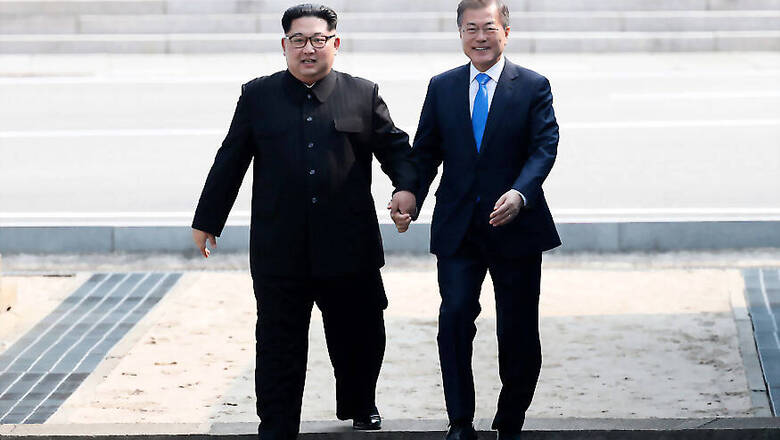
views
The fall of the Berlin wall in 1989 marked a tectonic shift in the global geopolitics and Europe, in particular. Is the inter-Korean détente going to have the same far-reaching impact on the geopolitics of Asia and the rest of the world? This question is stirring the minds of many observers and analysts. The signals, emerging from the historic summit meeting between North and South Korea, leave us in no doubt that the inter-Korean détente will be a watershed moment in the region’s search for peace and prosperity.
The Panmunjom Declaration, which President Moon Jae-in and Chairman Kim Jong-un signed after their summit meeting eloquently state that there will be no more war on the Korean peninsula, DMZ will turn into a ‘peace zone’ and a new era of peace and prosperity will begin. As regard to North Korean nuclear programme, which has been at the core of tension on the peninsula, the Declaration says that both Koreas will work together to reach complete denuclearisation.
Is the denuclearisation of the Korean peninsula possible? Many are skeptical about North Korea’s willingness to denuclearise. Despite many challenges, I remain optimistic that this time denuclearisation of the Korean peninsula is possible. My optimism is based on the following four grounds:
First, I believe that North Korea's pursuit of nuclear weapon is basically a regime survival strategy. Having achieved a certain nuclear deterrence, now North Korea is in a position to enter into the negotiations as an equal partner and can trade its nuclear weapons for benefits such as regime security, economic prosperity and normalisation of relations with the international community.
Second, my optimism stems from President Moon Jae-in’s ardent vision for a peaceful Korean Peninsula. President Moon does not see ties with North Korea as a zero-sum game. For him, both Koreas can co-exist until an eventual unification in the future. This led North Korean regime to believe in the sincerity of President Moon’s peace initiative and to agree to come to negotiation talks.
The third factor is President Trump's leadership style. President Trump is a dealmaker and for him North Korean nuclear issue presents a welcome opportunity to achieve a major foreign policy success at home, which though every US President had tried but failed to accomplish.
The fourth reason is that this time all stakeholders on the Korean peninsula - South Korea, North Korea, U.S., China, Russia and Japan - are serious in the pursuit of peace. They all recognise that North Korea’s nuclear program is in no one’s interest.
The overall implications of Détente are positive not just for two Koreas but also for the whole of Asia and the world. Denuclearisation of the Korean peninsula will lead to peace and prosperity in Asia. President Moon has promised a ‘new economic map of the Korean Peninsula’. The new economic map envisages three economic belts- one connecting the west coast of the Peninsula to China, making the region a centre of logistics, another connecting the east coast to Russia for energy and resource cooperation and the third across the land boundary for tourism. If North Korea abandons its nuclear weapons, the whole of Northeast Asia will be seamlessly connected through the network of roads and railway links. This will facilitate the wider integration of the region. The regional integration will create immense opportunities for business and commerce. Not just South Korean companies but also the U.S., Chinese, Japanese, Russian and others will benefit from Northeast Asia’s economic resurgence. The region will experience peace, stability and prosper together. It will set the course for Asia’s economic leadership in the 21st century, besides driving the global growth. The economic integration of South and North Korea will eventually result in their political integration.
In a nutshell, just like the fall of the Berlin Wall brought the iron curtain down on the Cold War and paved the way for German unification and then integration of Europe, similarly, inter-Korean détente promises a swift end to the longstanding division and confrontation on the Korean peninsula, the last remnant of the Cold War, ushering in a new era of peace and prosperity in the whole Asian region.
While I am optimistic about the wide ranging impact of the denuclearisation of the Korean peninsula, I am acutely aware of the challenges that lie ahead. Just a couple of days ago, North Korea abruptly cancelled high-level talks with South Korea. Such hiccups will be there along the way. We should be able to overcome these challenges with the leadership of stakeholder countries showing foresight and statesmanship. Peace must succeed and this time there are no reasons why it won’t.
India has always espoused the cause of peace in the world. It played an important role in ending the Korean War and founding of our Republic. When the Korean War broke out in 1950, India joined the international effort for establishment of peace in the Korean Peninsula by dispatching, not combat troops but a medical unit and a custodian force. India also accepted around 80 POWs who did not wish to be repatriated to either of the Koreas. In recent times, India has supported all efforts to bring peace and stability on the Korean peninsula, including, denouncing North Korea’s nuclear and missile tests and implementing the UN sanctions against North Korea. With such shining legacy of friendship, we are hopeful that India as a global power can help mobilise the global support for the success of the denuclearisation process and thus, contribute to peace and stability in the Korean peninsula and Northeast Asia.

(Author, Shin Bongkil, is South Korea’s ambassador to India. Views are personal)




















Comments
0 comment